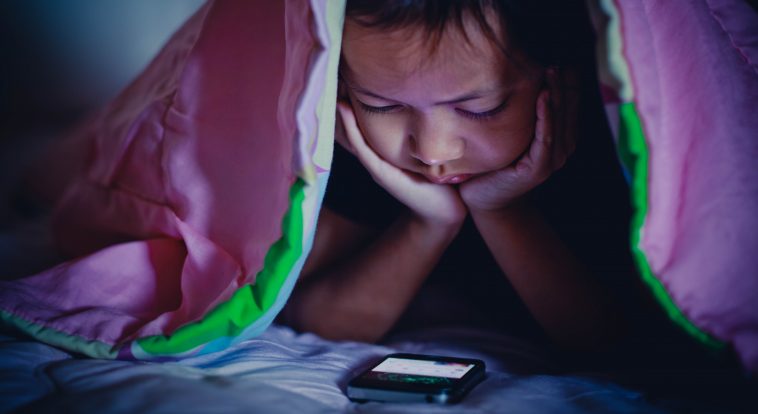I’m a firm believer in a no-screen policy for kids. No TV, no iPhone, no iPad, no laptop. No screens of any kind, especially before the age of 2.
The American Academy of Pediatrics recommends that parents “place a reasonable limit on entertainment media,” and not allow any screen time for children under 2. Despite those recommendations, kids between the ages of 8 and 18 average 7 ½ hours of entertainment media per day, according to a 2010 study by the Henry J. Kaiser Family Foundation.
That is a lot of time a day in front of a screen. So I know that in this day and age, my no-screen stance is very odd. I’m good with that. (Partially because I grew up without TV as a kid myself, alhamdulillah.)
What’s so bad about screens? Here are the main harms:
1. Shortened attention span
Screens provide fast-paced flashing images, which is correlated with shorter attention spans. Continuous exposure to such flashing images keeps eroding the attention span of children, and then we see rising rates of ADHD diagnoses.
2. Less reading
Screens become the primary source of entertainment, such that more sedate forms like reading, drawing, writing, etc become boring in comparison. TV presents an exciting extravaganza of lights and sounds. Books are still. Why read a book that requires the child to imagine and muster up the energy to summon mental pictures of the story being read, when the child can just sit and watch images made for him that parade themselves across a screen before his eyes? Reading now becomes arduous, taxing. TV is easier. It’s easier to be passive than active.
3. Wasted time
Screens waste a lot of time. There are so many better, more beneficial ways for a child to spend his precious years of childhood than to plop down in front a screen, even if it’s just one or two hours a day. That time is better spent exploring, piecing things together, adventuring, talking to a parent or a sibling, looking at pictures in a book (if the child is too young to read), being outdoors.
4. Less outdoor play
Screens have largely replaced outdoor time. This is a big one. We have slowly, over the past several decades, become a country of lazier, more sedentary people. We spend more time indoors than outdoors; much less time outdoors than our predecessors. Before this modern screen-riddled era we find ourselves in right now, people used to spend a substantial amount of time outdoors and in nature, which is proven to improve mood and overall physical and mental health (higher Vitamin D levels, lower rates of depression, etc). Now, however, we spend much of our time indoors, seated on couches, looking at screens. This shift from outdoors to indoors has impacted our collective health; we are now sicker, with weaker immune systems and more vulnerable bodies, than people before us. For kids especially, being outside is absolutely critical for healthy development. I will dedicate forthcoming posts to just this one issue alone, insha’Allah.
5. Obesity
It is constantly being announced that we are witnessing a national obesity epidemic in the United States, and that specifically childhood obesity is at an all-time high. Of course, the kinds of food we eat has a lot do with this phenomenon, but so does the amount of time we spend sitting down. The more active a person is, the better. Screens force us to sit down and be sedentary, which then slowly forms a habit of, and a preference for, sitting for long periods of time instead of moving.
6. Addiction
Kids (and adults) can actually become addicted to electronic devices, like an iPad, a smartphone, TV, etc. They become dependent on devices and use them as their exclusive form of entertainment. Without it, some kids have meltdowns and the only way to appease them is to hand them that iPhone. This happens with children as young as 2 years old, tragically.
7. Communication breakdown
In our digital age, many people are replacing face-to-face communication with text messages and social media. Instead of having a real connection in person, with eye contact and physical touch (which humans need developmentally), kids are getting used to communicating on a more superficial level purely through written texts and messages. This stunts emotional growth and interpersonal skills.
8. Innapropriate Content
This one is a no-brainer. The more exposure a child has to screens, the more he consumes the cultural programming of modern western society, which is hypersexualized and riddled with sexual content, violence, and foul language. As Muslims, this is the opposite of what we want to see, whether adults or kids. It’s even worse for kids.
9. Less obedience to parents
There are 2 reasons for this harm. One is that in any kids’ shows, including cartoons, parents in the show are made out to be bumbling buffoons who don’t know anything and who are constantly being outsmarted and outwitted by their own kids. In many cartoons and kids’ shows, the kids act flippant and disrespectful toward their idiot parents. The second part of this is that when a kid is watching TV and you try to call him over to you (to eat dinner, to help you with something, to go do homework), the kid is slower to respond to your call. They’re too engrossed in whatever is flashing across the screen to heed your mere calling of their name a few times. You, as the parent, are forced to compete with TV for your child’s attention.
10. Consumerism
TV, and even YouTube now, relies heavily on commercials. Every few minutes, the show is paused for the commercial break, and your kids will watch the commercials just as they watch the actual show. Companies rely on this captive audience to create artificial desire for their products and create revenue for their business. Avoiding screens allows you to keep your kids away from this endless parading of products and saves them from getting too deep into the consumerist mentality that we’re surrounded by.



